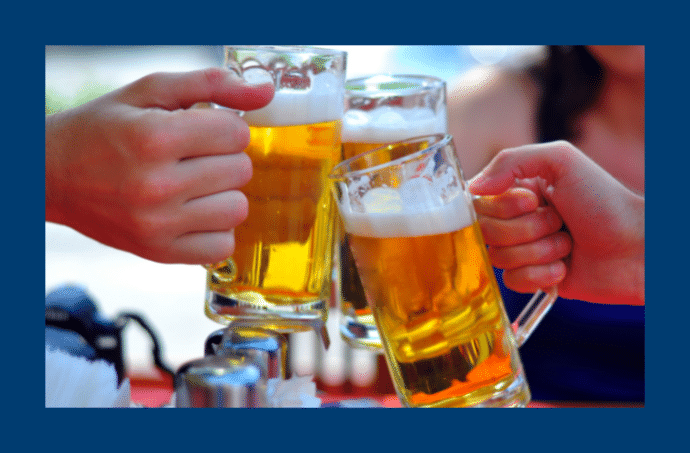
Ever wonder why staff at bars and restaurants are trained to never let you leave with an alcoholic drink? The reason dates to the end of Prohibition, when state alcohol regulations were formed, focusing on alcohol served within the confines of an establishment’s physical premises.
It took 88 years and a global pandemic to shift this rule, as many states – including Colorado – allowed to-go sales of alcohol to help the hospitality industry survive widespread business shutdowns.
Colorado and other states are extending to-go drink allowances, illustrating several legal changes around alcohol regulation that were born out of necessity during the past 17 months. These developments show how innovation during a crisis can provide improvements that may never have been considered under more normal circumstances.
Here are five important details to know about changes in the beverage and hospitality industries that are on tap.
Alcohol To-Go Till At Least 2025
In Colorado, bars and restaurants selling drinks that can be consumed outside of designated areas was an unthinkable idea before COVID-19 struck. Staff were trained to prevent customers walking out with alcohol because these actions threatened liquor licenses and created major liability.
In Spring 2020, after the virus shut down eateries and watering holes around the state, we worked with the industry and regulators to draft regulations allowing, temporarily, the sale of to-go and delivery alcohol by restaurants and bars. Gov. Jared Polis’ executive orders allowing to-go alcohol provided a small lifeline for on-premises establishments that were closed to the public.
In June 2021, the Colorado legislature and Gov. Polis extended these changes through at least 2025, with the enactment of House Bill 21-1027. Showing the importance of this measure to the industry, the Governor noted during his signing ceremony that 93% of Colorado restaurants and bars relied on to-go and delivery alcohol to supplement their revenue during the tough COVID-19 period.
Rules Still Apply
The freedom to sell and consume alcohol beyond lines that weren’t crossed for nearly 90 years doesn’t mean that all liquor licensing laws are thrown out the window.
Businesses still need to obtain a special permit issued by the Colorado Liquor Enforcement Division (LED) to sell or deliver to-go alcohol. Compliance obligations to lawfully participate in to-go sales will depend on training of staff, who will have to be vigilant for attempted underage purchases and intoxicated customers. The new state law and LED rules also set standards for labeling, delivery, and the types of sealed containers on to-go drinks.
Opportunities for Neighboring Restaurants
With the health and safety benefits of eating outside versus traditional indoor seating, restaurants naturally expanded their operations to patios, parking lots, and any other outdoor space they could find. This led to local governments around Colorado approving tables on sidewalks and other rights-of-way – and to neighboring businesses sharing common space between them.
In addition to carry-out and delivery alcohol, House Bill 21-1027 created new “communal outdoor dining areas” that allow adjacent bars and restaurants to share common outdoor space. Business principals should consider if their industry neighbors are good partners for such communal outdoor ventures. In addition to liquor licensing compliance, operators must agree on how to share liabilities, insurance, staffing, and hardware such as tables, chairs, and fencing. As a new innovation in Colorado liquor licensing, businesses must stay abreast of evolving LED rules for communal areas.
Opportunities for Even Bigger Spaces
Unlike to-go alcohol and communal areas, plans for “Common Consumption Areas,” which may encompass entire city blocks with closed streets, were percolating before the pandemic. The Colorado legislature passed the original Common Consumption Area law nearly a decade ago. But the shift in alcohol laws during the pandemic – and the focus on activating outdoor space – has led more cities to explore these models.
These areas offer potentially large outdoor experiences, with greater options for businesses and event programming, where consumers can move freely with their drinks in hand. With Denver joining the movement in 2021, as the jurisdiction with the largest concentration of bars, restaurants, and hospitality venues in the state, momentum is building for Common Consumption Areas.
Critical Hospitality Challenges Remain
The opportunities provided through novel legal changes for to-go alcohol sales, communal spaces, and common consumption are important for the hospitality industry. Yet, the pandemic has been devastating for Colorado’s bars and restaurants. Hospitality operators must now navigate severe staffing shortages, financial challenges, supply chain issues, and the evolving COVID-19 crisis. Up-to-date knowledge and compliance with pandemic orders and health protocols remains critical.
The creativity displayed by the industry and state and local government shows how Colorado’s bars and restaurants can survive – and thrive – again in the future.